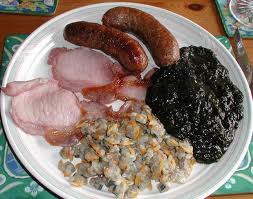Five new cases of Salmonella with possible links to laverbread have emerged in the past week bringing the total number to 17, said Public Health Wales.
Tests are continuing to confirm whether they are all linked to the outbreak, which has nine confirmed cases so far.
 Cases have been reported across south and west Wales.
Cases have been reported across south and west Wales.
Three people have needed hospital treatment, but have been discharged.
Health officials said a study has confirmed a strong association with laverbread from Penclawdd Shellfish Processing Ltd, probably produced and distributed between 5 and 8 March.
Last week, the company voluntarily withdrew its laverbread from sale as a precaution.
Samples taken from its Swansea factory have not shown any evidence of Salmonella in either food or in the environment, said Public Health Wales.
Laverbread is the boiled and minced laver seaweed, often fried with bacon and cockles as a traditional Welsh breakfast dish. The seaweed is eaten worldwide, especially in Asia, and is often used in Japanese sushi dishes.

